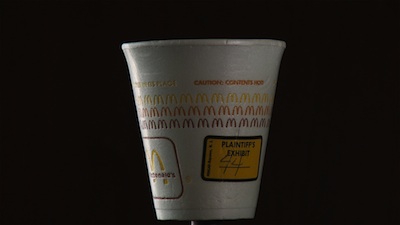
Frivolous lawsuits, tort reform, caps on damages, just a few legal terms that if you asked the average person on the street the likelihood they would know what these things are is questionable–or at least that is the belief Director Susan Saladoff wants you to have given her on-the-street interviews in the documentary Hot Coffee. The film centers around four specific cases, each relating to one of the above terms, and how they have impacted the legal system today. It is an incredibly dense documentary that provides little entertainment value to the material being presented. Consisting of interviews with the parties involved in each case as well as others, and additionally legal jargon or definitions titled throughout Hot Coffee feels like an educational video. In its defense, it provides great detail on the matters addressed, yet it is plagued with poor production values and a clear social message at the end that is off-putting to a viewer who is not easily influenced.
The first case, that of the famous McDonalds lawsuit where a woman was burned by a cup of coffee opens the film. The facts of the case are given and it is a positive discourse on the matter. The “story” one may know of the lawsuit, the facts involved, have obviously been skewed in the media as to what really happened. Proof of the actual severity of the burns is given by showing the original photos taken of them that were so severe she required skin grafts. The images are graphic, and the resulting evidence against McDonalds makes the notion of this lawsuit being frivolous a ridiculous conclusion by the public, media, or the judicial system.
The three cases that follow include a Supreme Court Justice in Mississippi who was attacked by various agencies because he did not support tort reform. The next, that of a child born with cerebral palsy due to medical malpractice at birth whose parent’s won their lawsuit against the doctor but due to caps on damages they were awarded roughly one fifth of the amount the jury awarded them–an amount that will not cover the medical expenses of the child through adulthood.
The final case may be the most interesting, and disturbing as to the measures taken by companies to protect themselves. It is also a case that does not exactly fit into the larger scope of the film. This case deals with mandatory arbitration agreements and the impact one had on a woman when she was violently raped while working for a private company in Iraq. Due to the arbitration agreement in her contract she was unable to request a court trial against the individuals who harmed her, or the company for putting her in harm’s way. She continues to fight for change and for her own rights.
Hot Coffee is a documentary that gives one side of the story, with very strong convictions. It is clearly noted that none of the individuals, or representatives of the company’s mentioned wanted to contribute to the film. The measures, or how hard Susan Saladoff tried to get someone to speak out is unknown. Given her clear decision to use the Bush Administration and Big Business as the enemy speaks a great deal as to who this documentary is trying to appease, or influence. The public service announcement warning at the end of the film is obnoxious, to the say the least. As is the Casio programmed button score attached to the entire film that is obviously trying to heighten the dramatic effect of the information but it only hints at a low production value.
Hot Coffee cannot, and should not, be considered an inferior documentary as it does bring to light important information that many people are probably not aware of. It is unfortunately part of the documentary genre that is not a well rounded portrayal of a subject matter making it open for debate, and rejection easily. For a novice on the topics it will definitely spark an interest in learning more, for the more knowledgable it will only infuriate you as to the problematic nature of presenting the material in such a bias manner.
Hot Coffee will air on HBO in 2011, for more information visit Hot Coffee The Movie.
Synopsis:
The infamous McDonald’s spilt coffee case, which is always held up as a prime example of a “frivolous lawsuit,” forms the starting point of Susan Saladoff’s eye-opening, infuriating investigation into the ways corporations and big business are gaming the civil justice system to deprive us of our rights. And spending billions to make us believe this is a good thing. After hearing the facts, you’ll think twice about calling that lawsuit frivolous. The four stories she tells, from a raped female soldier who has no legal recourse against her attackers to the judge whose name was smeared for opposing tort reform, cast much needed light on a subject that’s been deliberately kept in the dark.
Credits:
(USA, 2010, 88 mins)
Directed By: Susan Saladoff
Producers: Susan Saladoff, Alan Oxman, Carly Hugo
Cinematographer: Martina Radwan
Editor: Cindy Lee
Featuring: Stella Liebeck, Jamie Leigh Jones, Senator Al Franken, John Grisham, Oliver Diaz
Music: Michael Mollura

